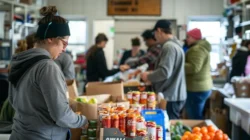In 1968, Georgetown University became the first Catholic institution in the country to employ a full-time rabbi when it hired Harold White, a 36-year-old ex-military chaplain, as a Jewish Chaplain and Lecturer in Theology. But it was not so he could lead Georgetown’s Jewish students, who by his estimate made up just one percent of the student body at the time.
University President Rev. Gerard Campbell told him he was interested in the common roots that Christianity and Judaism share. He wanted White to teach Georgetown students about the deep connection between the two religions—about how Jesus was born and lived as a Jew, and about the ways Jewish thought influences Christian tradition.
Though he was surprised by the offer, White accepted.
“That idea allured me, the idea of teaching Judaism to non-Jews to make them appreciate their own religion more,” he said. “That’s really the reason why I came.”
From forging lasting relationships with students and alumni of all faiths to establishing the Program for Jewish Civilization in the School of Foreign Service, White has arguably done more than anyone else to build and strengthen the school’s Jewish community in the four decades since he first came to Georgetown.
“He is Jewish Georgetown,” Jacques Berlinerblau, director of the PJC, said. “There’s no Jewish Georgetown without Rabbi White. On any level—intellectual or spiritual—his is an incredible body of work that has affected thousands, potentially tens of thousands, of people.”
In conversation, the people skills that helped White forge so many connections are readily apparent. Silver-haired and wizened but retaining an affable vigor, White sounds authoritative without being condescending, and is simultaneously formidable and approachable. He combines the networking skills of a politician with the warm openness of a religious man, emanating a gruff but personable kind of charm.
“Rabbi White is irreplaceable,” Rev. Philip Boroughs, Vice President for Mission and Ministry, said. “He has been one of the most significant leaders of our religious community in the myriad ways that he has served the Jewish community on and off our campus.”
But soon, he will have to be replaced. After 42 years as the University’s Senior Jewish Chaplain, White decided to retire at the end of last June and take on an advisory role at the PJC.
A committee formed by Boroughs of students, faculty, staff, and campus ministers of different faiths is in the process of choosing his successor and hopes to announce a selection by the end of this academic year. But because of his omnipresence and comprehensive personal connections in the Georgetown Jewish community, it will be difficult for any anyone to replicate fully the role he’s performed.
“We are not seeking to replace Rabbi White, but to find a worthy successor,” Boroughs said.
White’s tenure at Georgetown, inspired from the onset by a desire to increase Catholic-Jewish understanding, can be measured in part by the constant dialogue between Catholicism and Judaism that inspired his hiring in the first place.
Besides teaching hundreds of Catholic and Jewish students, perhaps his biggest contribution to interfaith understanding on campus was the establishment of the PJC in 2003 with the help of Georgetown professors Robert Lieber and Yossi Shan. Offering a certificate program in the SFS and a minor in the College, the PJC is dedicated to exploring Judaism as a community and as a civilization, and to promoting interfaith relations, especially Jewish-Catholic understanding.
According to Berlinerblau, it is the first and only program of its kind at a foreign service school in America. Thanks in no small part to the courses and guest lectures provided by the PJC, interreligious dialogue has become something of a specialty for Georgetown.
“If there’s something we do at Georgetown, it’s interreligious dialogue. There’s no shortage of it,” Berlinerblau said. “I know of few universities as committed to the question as we are.”
Rev. Kevin O’Brien (COL ’88), executive director of Campus Ministry, traces Georgetown’s particular interest in Catholic-Jewish discourse back to Nostra Aetate, a document that came out of the Second Vatican Council meetings in 1965 which called for an increased commitment to vigorous, open dialogue with Judaism.
“Georgetown took it very seriously,” he said. “One of their responses was hiring Rabbi White.”
Ever since, the Jewish Chaplaincy under White has been geared almost as much toward engaging non-Jewish students as it is toward providing the Jewish community with religious services. O’Brien remembers looking up to White during his time as an undergraduate and said that, though he is Catholic, he considers White his rabbi.
According to Debbie Reichmann (COL ’93), Campus Ministry’s Jewish Program Coordinator, the Jewish Chaplaincy organizes events like a Jesuit-sponsored Shabbat service during Jesuit Heritage Week, and a Jewish-Christian interfaith Passover Seder designed to highlight the connection between Passover and Easter, in addition to standard services for major Jewish holidays.
While it emphasizes these kinds of interfaith events, the Jewish Chaplaincy’s main purpose is to provide religious services and support for Georgetown’s Jewish students. The exact number of Jewish undergraduates is difficult to measure, but Reichmann says six percent of the current student body identified as Jewish on their applications. Of these, she estimates about a quarter—around 100 students—are religiously active.
The Jewish Student Association exists to give this small but robust population of practicing Jewish students a sense of belonging at a Catholic school like Georgetown. Making frequent use of the Jewish Community House, a University townhouse on 36th Street and the sole space on campus designated exclusively for Jewish religious and cultural events, the group holds weekly Shabbat services and acts as a social hub for the Jewish undergraduate community.
As the Jewish community and the JSA grow, the house is proving increasingly inadequate.
“It is unequivocally not big enough,” Jesse Mirotznik (SFS ’12), co-president of the JSA, said. “A house is an awkward space to have a prayer and community center to begin with, but as a growing community, it really doesn’t fit our needs at all. I can think of two events just in the past two months where people have showed up and found it to be so crowded that they left because there just wasn’t enough space.”
The lack of space makes attempts to interact with and engage other student religious groups even harder. Mirotznik said he is worried that there will not be enough space to fit both the JSA and the Muslim Student Association during their upcoming joint Shabbat service.
Campus Ministry is aware that the Jewish Community House by itself is insufficient, but it doesn’t seem to have a solution.
“We recognize that the space is inadequate,” O’Brien said. “Getting more space for Jewish students is a priority. … It just comes down to restructuring and reorganizing the space that we have.”
O’Brien also pointed out that the Muslim prayer room in the Copley basement doesn’t meet the needs of the Muslim community, either.
Concerns about meeting and prayer space notwithstanding, Jewish students don’t seem to have much trouble retaining their identity and practicing their religion at Georgetown.
“A lot of Jewish students I know were worried because Georgetown is so Catholic,” Merav Levkowitz (SFS ’11) said. “But I’ve been pleasantly surprised by Georgetown. There are so many Jewish activities and a lot of flexibility. It’s a pretty big presence on campus.”
Mirotznik said he initially loved everything about the school except its Jesuit identity. But he discovered that Jesuit values were very close to his own, and that he has come to appreciate the school’s heritage.
“I’ve had a lot of good experiences with Jesuits on an interpersonal level,” he said. “I wouldn’t change Georgetown’s Jesuit identity if I could.”
Students and administrators, both Jewish and non-Jewish, tend to agree that the University fosters an extremely welcoming environment for students of any faith.
“Georgetown has historically been a very welcoming environment for all faiths,” Reichmann said. “It’s a very spiritual place.”
Whoever ends up succeeding White will have the luxury of working at an especially open and welcoming campus. For Rabbi Bruce Aft, the Interim Jewish Chaplaincy Director filling in for Rabbi White for a year while the search committee finds a permanent replacement, the transition from leading a congregation in Springfield, Md. to Georgetown has been a smooth one.
“It’s amazing how welcoming everyone has been,” he said. “The whole community has provided support with any issues I’ve had so far.”
Though Mirotznik said that Aft has done “a fantastic job” in his first two months at Georgetown, JSA Co-President Lili Bayer (COL ’11) said that it would be difficult for the community to adjust to anyone, no matter how competent or qualified, after having the same rabbi on campus for over 40 years.
But White has a good idea of what he wants his eventual permanent successor to bring to the table.
“We need an energetic individual with a vision for the future, someone who’s committed to interreligious dialogue,” he said. “Someone who has experience in building community.”
White said he hopes to see the PJC expand into a full-fledged academic center with endowed faculty chairs and a graduate program in the future. He also expressed a desire to see closer collaboration between the Jewish Chaplaincy and the PJC, and even suggested the creation of a center for Jewish-Catholic understanding akin to Georgetown’s existing Center for Muslim-Christian Understanding.
“It’s very difficult for non-Jews to recognize that Judaism is more than a religion, that Judaism is a civilization,” he said. “That’s why I created the PJC, to present Judaism as a civilization, as more than a religion. That’s where we need education.”
Reichmann said that though she was pleased with the state of the Jewish community at Georgetown when she was an undergraduate in the early ‘90s, when she returned to campus over a decade later to start working for Campus Ministry, she was shocked by how much Jewish organizations had expanded. For that reason, she is excited what the future will hold.
“I’m happy with where we are, but I don’t want to close the doors on improvement,” she said.
White sees the future of Judaism at Georgetown, just like the four decades he spent at the helm, being defined by interreligious dialogue, but perhaps of a slightly different variety.
“We’ve changed. We have to look at the campus and realize that we are no longer just children of Abraham here—we’re Jews, Catholics, and Muslims, but we’re also Buddhists and Hindus,” he said. “I’d like to see an increase in dialogue with the non-Abrahamic faiths. That would mean a great deal to me.”
In White’s view, Georgetown is a perfect place for this kind of dialogue to happen.
“Georgetown students are far more spiritual than at other universities, because religion is expected. It’s encouraged. Religion is very respectable here,” White said. “Georgetown is unique.”





